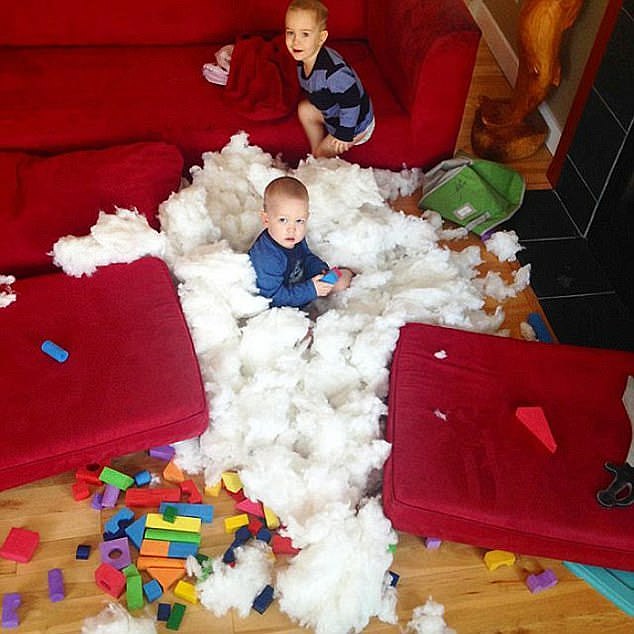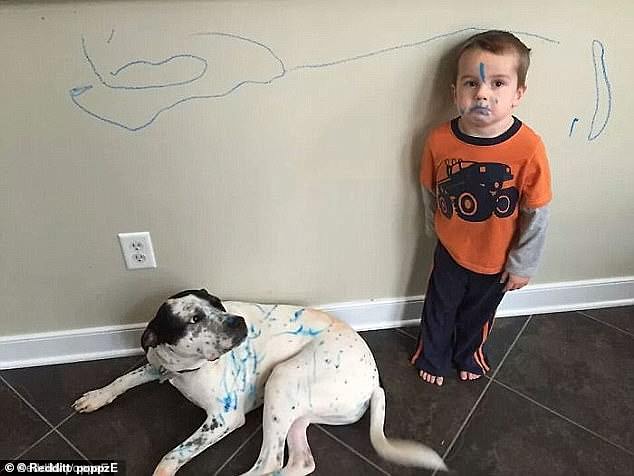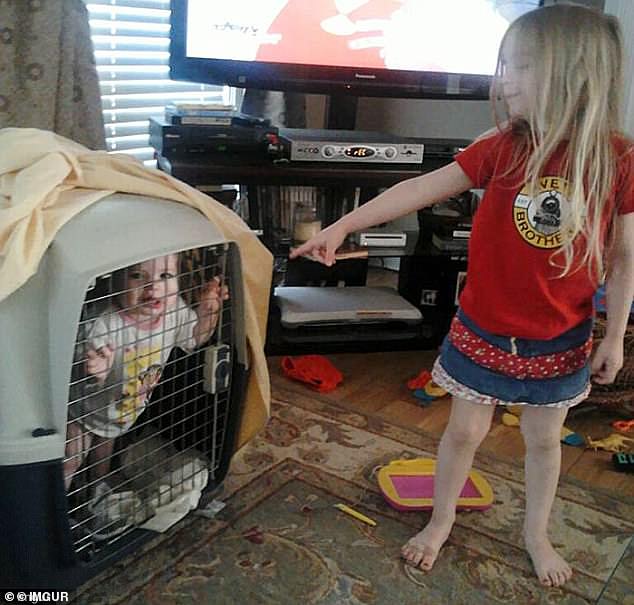How young is too young for kids to stay home alone? Here are the rules in each state
A growing number of parents are grappling with a burning question: How young is too young to leave your children home alone?
As stories of unsupervised children making shocking decisions flood social media, experts warn that what seems like innocent independence can lead to serious consequences.
In September, an unsupervised 8-year-old girl took her mother’s car for a 25-minute ride to Target. Fortunately, only a mailbox was damaged in the alarming incident and it remains unclear whether or not charges have been filed in this case.
Just days ago, an Ohio mother was accused of leaving her three children home alone without a phone while she was away for nearly three days.
Self-expression: A little girl found no better support for her painting work than her parents’ computer monitor, and climbed onto the table for better access

Tasty? Photos show what kids do when left to their own devices, including one little girl who poured half a tub of Sunny D on the table and, of course, started licking it

Foam part! A group of three children somehow managed to fill the bathroom with bubbles
The mother of three is now facing serious consequences, including jail time, as a result of her questionable decision.
What is the legal age to leave your child unattended?
There is no national minimum age at which children should be left home alone, and while a few states have established a legal age, most have not.
But the bottom line is that ‘it’s mostly up to you, the parents’, TODAY.com say.
In general, 12 and older is “a pretty acceptable age,” family therapist Sheryl Ziegler told the publication, echoing the recommendation of the American Academy of Pediatrics.
Ziegler’s suggestion comes as she describes how tweens (children ages 9 to 12) have typically experienced mild independence, such as walking to a friend’s house or to the bus stop.
Still, she emphasized that every child is different and that each child’s overall comfort level, maturity, emotional and physical health, environment, and access to support are all factors that should be considered before taking the calculated risk.
But if parents choose to take the plunge, it is crucial to learn the state law and its nuances to avoid accidentally neglecting children.
“Many states’ child welfare laws classify ‘failure to provide adequate supervision of a child’ as child neglect,” the U.S. Department of Health and Human Services.
“But in most cases, states do not define what is considered ‘adequate supervision.’

Tasty! For one toddler, peanut butter was so delicious that the only logical thing to do was to cover his entire face and body with it

How? Two toddlers have apparently managed to remove all the filling from a sofa cushion
Colorado The law, like most states, does not set a specific age after which a child can legally be left home alone, but there remains an informal guideline of age 12 for when it might be appropriate for a child to be left alone for short periods of time. is becoming’. ” according to the Colorado Department of Human Services.
In Georgia“Children eight years of age or younger should not be left alone,” the state Department of Education said. ‘Children between the ages of nine and twelve may be left alone for short periods of time (less than two hours), depending on their level of maturity; and children thirteen years of age and older, who are sufficiently mature, may be left alone and, as authorized by the parent, may act as a babysitter for a maximum of twelve hours.”
Illinois The law allows children 14 or older to legally leave home without parental supervision if the minor is neglected for only a “reasonable” amount of time.
‘Does the caregiver leave them alone for two hours or five days? Who else does the child have to care for?’ a spokesperson for the Illinois Department of Children and Family Services told TODAY.com.
Maryland Family law states that it is a crime to leave a child under eight years of age unattended, locked or confined in a house, car, building or other space without proper supervision
Just like in Maryland, North CarolinaThe Fire Act stipulates that a child under the age of eight may not be left alone unattended.

Doodles for everyone: One boy left blue marks on the wall, the dog and of course his own face

Time Out: A little girl appeared to have locked her sibling in a crate somehow, which seems better suited for pets than young children

Get a good rest: A little boy was visibly so exhausted that he fell asleep with his hand still stuck in a jar of something that looked incredibly delicious
Oklahomathe Sooner State, has no specific legal age requirement, yet according to Oklahoma Human Services, “infants and children under the age of six should never be left alone without adult supervision.”
‘Oregon “The law states that a child under the age of 10 shall not be left alone for any period that could endanger his or her well-being,” the Oregon Department of Human Services said.
In both Tennessee And Washington There are no laws in the state requiring children to reach a certain age before leaving home unsupervised. There is an informal guideline for the age of 10, according to the respective legal systems of both states.
All other territories have no specific age requirements under state law.
But even if you trust your child, he or she may not be prepared for this milestone.
Ziegler, author of ‘The Crucial Years: The essential guide to mental health and modern puberty in middle childhood’, recommends using an experiment during the day to test whether a child is comfortable and interested.
She also adds that if parents are left alone at home, keep alcohol, tobacco and weapons safely locked away and out of the reach of children.
As children grow older and the line between childhood innocence and independence blurs, parents face the complex decision of whether or not to take the measured risk.
